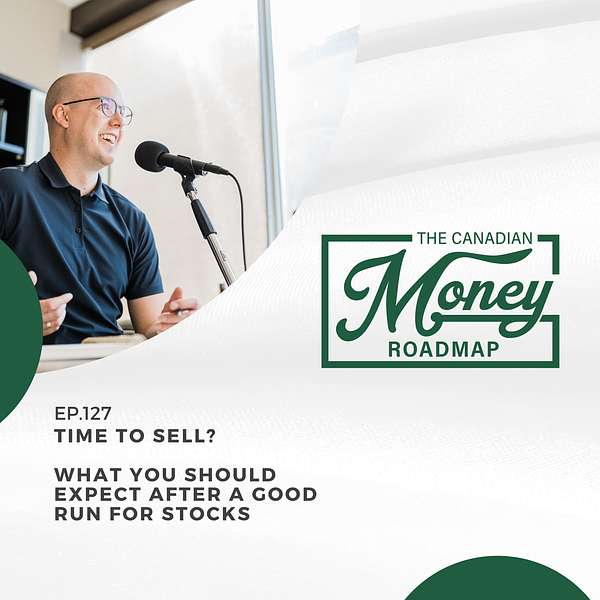
The Canadian Money Roadmap
Invest smarter, master your money, live & give more
The Canadian Money Roadmap
Time to sell? What you should expect after a good run for stocks
The stock market has looked great recently! Is it time to take some money off the table?
In this episode, I walk you through the considerations you need to make to decide whether it is time to sell or stay the course.
Retirement Readiness Scorecard 🇨🇦
Looking to retire in the next 10 years or less (age 45+)?
Get your money organized - Your Full Financial Picture Spreadsheet
Hello and welcome back to the Canadian Money Roadmap Podcast. I'm your host, evan Neufeld, on today's episode. The stock market is up. Should you get out of the market? Is this a good time to sell and take some profits off the table? Well, I got a question like this from a client of mine recently, and so I'm going to give you a few things that you can consider when you make this decision for yourself.
Speaker 1:The last six months or so have been really strong for equity investors. Whether you're in Canada, in the US or have a globally diversified portfolio, your returns have been pretty good if you've been in the stock market. So, looking at things as I'm recording today, over the last six months, the Canadian stock market, measured by the TSX capped composite index, has been up about 17.5%. The S&P 500 is a little bit over 20%, and so somewhere in between there is an ETF. Many of you know and love the Vanguard All Equity ETF portfolio, veqt. It's up about 18.25%. Again, that's just in the last six months. If we put this in the context of expected returns, again for an all equity investor talked about this on a very recent episode here but if you have an all equity portfolio, globally diversified around the world. If you're expecting in the ballpark of six to 7% per year, that seems reasonable, and so for a six month period of time to triple, that seems a little bit outrageous. Whoa, this has got to be too good to be true. When's the crash coming? So I got a question from a client recently in this regard, and so today we're going to take a look at a few ways to think about this, or to put this into a bit more of a broader context, so that you can make a better decision or a more informed decision for yourself.
Speaker 1:Now, the first thing to get out of the way is that I don't know what will happen tomorrow, and nobody knows what will happen tomorrow. And if somebody is trying to tell you that they do and I say tomorrow loosely, that could be next month, next year, whatever If someone is saying that they know the future, you can promptly disregard them because no one knows what the future holds. So all that to say. If we're looking at things today, they've been quite good over the very recent past here, and so on a go forward basis. I don't know, it could look great, it could look bad, but this is how you make a decision with a variety of unknowns.
Speaker 1:So let's first look at returns in a bit of a historical context. The expected returns that I talked about before. Those are numbers that you can use as a long-term annualized number, which they then would include both the good years and the bad years. Right, because the long-term average requires some exceptional years to then offset the poor years. Right, you can't just have six to 7% returns and then a few minus 20s or 30s sprinkled in there and then still maintain that average of 6% to 7%. No, you have to have some exceptional years to offset the poor years. So if you're taking money out of the market after it has done well recently, you can really cut the legs off of your returns. If the market continues to perform and no one knows what's going to happen tomorrow and you, in theory could time the market perfectly, but historically that has been very difficult to do on a repeated basis. Make it lucky once or twice. I wouldn't recommend it because the odds are stacked against you.
Speaker 1:I think I've talked about this on the podcast relatively recently. I know I did a YouTube video about it, but Dimensional put out a piece back in September titled why a Stock Peak Isn't a Cliff, and it took a look at a thousand monthly closing numbers between 1926 and 2022 for the S&P 500 and found that 30% of months in that period of time ended at new all-time highs. And so if you're saying, okay, well, it was good recently, perhaps one of these all-time high months, how often did the next period of time result in a crash? The idea that the stock market has some sort of gravity where what goes up must come down. Well, one year later again, this was nearly a hundred years of data. At the end of every month that ended at an all-time high, a year after that month, the average return was 13.7%. Three years later is 10.6 and five years later is 10.2. Okay, so those were the results after all-time highs. Now what about any other month, any other random month? Well, they're pretty darn similar. So, a year later that this is any month that ended at any level a year later, the average outcome was 12.4%. Three years later, 10.7 and five years later, 10.3. Okay, so this is just showing that reaching a new high doesn't mean the market will then fall.
Speaker 1:So, from historical context and just having a decent understanding of how averages work, there will be good periods of time and that's okay, and those are required for you to actually get the long-term expected return from that asset. You don't have to get nervous if you have a year that's better than the expected return because, also, the market almost never returns the exact average amount. So, ben Carlson, he's a great finance content creator and he works for a firm in the States called Ritholtz Wealth Management. Ben wrote a piece a few years ago digging into the data from the US going again back to 1926. And, as you picked up there, the long-term average for the US stock market has been about 10% per year. I talked about this recently and why we shouldn't expect 10% going forward, necessarily, but we're just going to talk about the pure numbers here, again in historical context.
Speaker 1:So if you take the ballpark average, so say it was 10%, you plus or minus 2% on either side. So the range there is between 8% to 12%. This data just goes to 2020. So it's 1926 to 2020. There were only five calendar years during that range. It's 95 years. Only five calendar years actually gave you an 8% to 12% return at the end of the calendar year. That's crazy. When you see the data you don't really realize that the expected return has almost never occurred or the long-term average has almost never been achieved on its own in a given year. There have been just as many years over 40% than in the 8% to 12% range.
Speaker 1:So all that to say, if you have a better than expected year, that should also be expected in some aspects, right? Because more than a third of all years have had a gain of 20% or more. And this just makes sense too, based on getting those long-term averages over a period of time. And you factor in how big some of the drawdowns have been. You know, go back to the dirty 30s and then the black Monday crash in 1987 and 2008 and 2009,. The big declines there. Even the COVID crash went down 30% in a month, right? So to be able to get meaningfully positive returns, you have to have some good years that really offset those ones. So you need to participate for the long-term to be able to get the long-term returns of the market.
Speaker 1:So to answer the question originally, from this the impetus for this episode should you get out because the market had done well recently? It's like no, because the good years in the stock market are probably going to be above that average number in a historical sense and the evidence doesn't point towards a good year coming before a particularly bad year with any sort of predictability. So you can guess and get it right, but you can also guess and get it wrong. So my suggestion to you would be to not guess and just stick with your plan. And that leads me to the next point, which is probably more important than historical context, is your situation. Why are you investing in the first place, and what stage of the journey are you actually on?
Speaker 1:So if you're investing for an eventual retirement and you're still accumulating let's say, put myself in those shoes by getting out of the market after a good year or in the middle of a good year again, because we don't know you're essentially trying to time the market, and this is just a losing proposition, because you're far more likely to lose money by trying to time the market than you are to make money or avoid risk altogether by doing so. If you're in this position, you're young, you're still in your accumulating years, you've got a good job. Keep building, enjoy your life, embrace the good times along with the bad. By sticking to your plan of long-term consistency, of adding regularly regardless of what's going on, you build your portfolio on autopilot instead of trying to be the pilot, the mechanic, the ground crew and the air traffic controller all at once. It's impossible. Don't do it, just set everything up to be as automated as possible.
Speaker 1:So if you're in those accumulating years, this is relatively straightforward for me to say don't time the market. Okay. Now if you're already currently living off your portfolio, you're already retired, it might be a different situation a little bit, because if you're already retired, it might be a different situation a little bit, because if you're living off your portfolio and you and I both know life happens you suddenly realize that you need to make a large purchase. I would recommend that you take some money off the table and set it aside for that purpose. But this has very little to do with what the market has done recently and more to do with what your goals and timelines are, Because if you know you need a specific amount of money in a specific short-term timeframe I say less than three years it shouldn't be in stocks anyways, and even over three years, being in the stock market is a bit tough to justify. But anyways, over a short period of time, that money shouldn't be invested in stocks, and that has nothing to do with whether the market has done well recently or poorly recently. That's just based on your goals and timeline, because we never know what the market will hold or what the market will bring tomorrow, but we know what spending needs to happen tomorrow. So if you can base your withdrawals more so on what you know than what you think might happen, you're going to be in much better shape over the long term.
Speaker 1:This kind of thing happens with retirees all the time. It's not because it's poor planning or they're terrible at planning their expenses, but it's just things happen right. So having some cash reserves as a retiree is Prudent planning to account for the unexpected. Having some cash set aside allows you to make sure that you're not pulling money out of the stock market at inopportune times. Sometimes that's going to happen right. But just as a bit of a principle, having a little bit on the sidelines is okay. A little bit of inefficiency in the portfolio leads to a lot of efficiency when the right or the wrong time hits right. So if you're withdrawing consistently in bad times, that can really create an anchor on your long-term results.
Speaker 1:So another thing to consider is a retiree with a flexible spending plan in retirement. This can be optimal in a perfect implementation. The challenge is the perfect implementation. None of us are robots, and dealing with emotions and unexpected situations makes things really challenging to implement a perfect, flexible spending plan in retirement. But the main idea here is that when the portfolio is above, say, a certain threshold, you can start spending more, and when it's down below a certain threshold, you've got to slow down spending. A lot of people do this a little bit intuitively, but it requires significant discipline to do it in a perfect way, because there's more good years than bad years.
Speaker 1:Historically, it's very easy to build a lifestyle around the good times, and then it's much, much harder to slow down based on what the market is doing, especially if there's, say, inflation. That was happening. So that's what happened here in 2022. Inflation really started to get out of hand, so everything got more expensive and the stock and bond markets were all down. So it's all well and good to say, well, I'm going to be disciplined and I'm just going to spend less. Like, okay, yeah, and inflation's 10%, right, everything that you bought last year is just 10% more. So can you actually spend 20% less to overcome that? Probably not right. It just becomes hard to do that. So if you're someone that has enough wiggle room baked into their financial plan already, and then your portfolio is up quite a bit more than expected. Yeah, okay, spend a bit more. That sounds pretty good.
Speaker 1:I said to this client here who sent me the email I said if you're someone who is already willing to take on more risk, you should probably be able to enjoy the fruits of that if and when it works in your favor. You also have to be humble enough to know when it's not working in your favor and adjust accordingly. But anyways, this one is so much more dependent on your situation. For someone that's still in that building and accumulating mode, if you're looking at your portfolio and you're saying, oh wow, this is really good, I'm going to take a little bit off the top and go on a little extra trip or upgrade the vehicle or something like that, it could work again, depending on your situation.
Speaker 1:But largely speaking, if you're contributing to your long-term retirement plans at a rate based on typical expected returns, these good years or good periods of time need to be part of the equation too, to offset the years that are inevitably going to be not so perfect. So long-term averages are very lumpy, or the road to the long-term average is very lumpy, I should say. So take the good while you can, because it's not always going to be this way, and just know that it's all part of the journey. Again, if the spikes and the dips are too much for you, not being an all stock investor is okay. Having some bonds in your portfolio is actually the norm. That's the whole idea of a balanced portfolio. You don't have to have 40% in bonds, but you can have 10%, 20%. It just takes the edge off a little bit, but that's an asset allocation question that is better defined for you as an individual.
Speaker 1:But anyways, I just wanted to talk about the stock market today, as it relates to taking money out after a period of time has been particularly good. Again, the best answers here are usually done in the context of one's personal circumstance, and so, if you do not have a financial plan, head over to my website, evanneufeldcom, and you can check out the financial planning page for our pricing and process, and you can fill out the form on our contact page to connect with us and see if working together might be a good fit. If it's not, there's a few other planners that I would be glad to connect you with, because I just want everybody to have a better handle on their finances, and that's the whole point of doing this podcast. So, anyways, thank you so much for listening to this one. If it was valuable for you, I'd love to hear about it. Feel free to leave me a review on Apple Podcasts or a rating on Spotify, wherever you're listening. Thanks so much and we'll see you on the next episode. Thanks for listening to this episode of the Canadian Money Roadmap Podcast.
Speaker 1:Any rates of return or investments discussed are historical or hypothetical and are intended to be used for educational purposes only. You should always consult with your financial, legal and tax advisors before making changes to your financial plan. Evan Neufeld is a certified financial planner and registered investment fund advisor. Mutual funds and ETFs are provided by Sterling Mutuals Inc.








